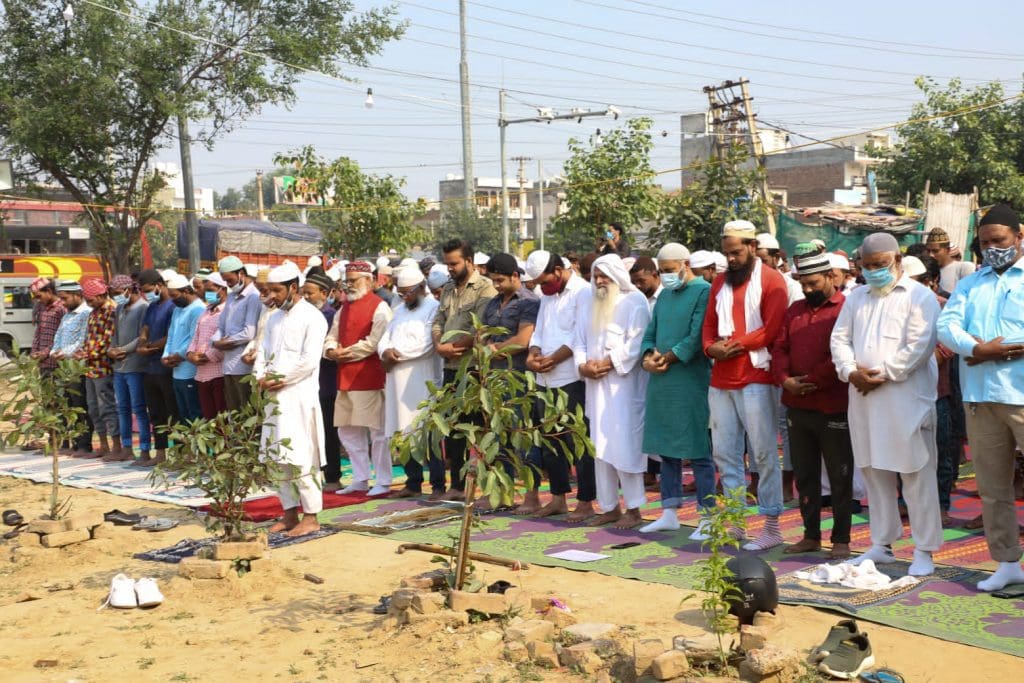
The recent incident in Sector 12 of Gurugram on 5 November, Friday, indicates the systemised issue on the evaluation of public- private sphere of India. Here, in the contemporary country cypher, the most subjective binary is Hindu – Muslim and cultural matters in conflict. This open protest clearly shows the strong participation of BJP leader Kapil Mishra. The slogan ‘Hindu Ke Gaddaron Ko, Goli Maro Saalon Ko’ is a pratfall for the native Muslim community and their freedom of expression to spirituality (Namaz) along with distributed estates as equal citizens of India in Gurgaon.
However, public-ness and the public sphere have taken a new beginning in New India as electoral autocracy with cultural ethos and pathos. It is majorly linked to regional to national politics, legitimation, and accountability prospects that were absent from previous post-colonial India. After this event, which is specially organised on Goverdhan Pooja, the head raised an opponent questions of very nature that:
- Has it openly acquired the susceptibility to recent yet advanced Hindutva Ideology and their anomalies behaviour towards Muslims in the Public Sphere is the destiny of Indian secularism? or,
- The falsely associated noun ‘ tolerance’ with Muslims as most ‘less tolerate’ community do give a new turn in politics as every individual attack on Muslims spirituality and freedom of expression in public to deprived in near past to present with ‘general opinion’ where state affairs legitimised to gain attention over Muslims as an issue for every upcoming election?
In any consideration of the public sphere, each religion has space to perform spirituality according to the Indian Constitution as the public itself defined and given shape in a secular state and institusnalised multiculturalism. It involves diverse ways to reflect the adequate nature of democracy. Meanwhile, Hindutva Ideology systematically tries to portrait ‘Muslims’ as ‘problematic community’ as they have different religious practices from different geographical originate religions – Islam.
In addition, authentic ground reporters with various digital platforms say that ‘ For local Muslims, the government has distributed that open land for Namaz in 2018’. But the matter turned with influx reasons as ‘Shararati Tatav’ (the Muslim men as mischivious entity) where such opinions are entirely passive and provoked insecurity in sector 47 of Gurugram for that sector’s local Muslims. On 29 October 2021, Professor Hilal Ahamd wrote similar arguments in his article that ‘ Namaz isn’t an anti-Hindu act, Time for every Indian to defend Islam’ and he gives dive reasons behind Hidutva’s strategies to oppose performing Namaz as an antithesis of Hindu religious practices in public as there are of course significant contradictions with legitimised ambiguity on Muslim Identity with insecurity frame, and a state like Gujarat holds ‘Disturb Area Act’ in Ahmedabad city to legalised ‘social exclusion’ for Muslims.
Over the years especially with the growing existential disillusionment with the state and its ability to generate antagonist predetermined mind for Muslims is monotonous and increasingly associated with BJP leaders. German philosopher and a prominent scholar on the public sphere, Jürgen Habermas mentioned in his documented book ‘Structural Transformation of The Public Sphere’ about the crucial role in molding prejudices for particular communities and classes.
In the debates and opinions for Muslims in India, the public is frequently associated with state matters through media instead of individual liberty. In particular, Hindutva goon succeed in promoting religion as a ‘vintage point’ rather than the rational self-interest.
The sets for the Muslims in India challenge the preponderance of the state in the public sphere and attempt to carve a space where the action of the state is subordinated to the rights of the citizens including Muslims of India. Indeed, the public sphere acts as an expression of open categories to people of all categories, irrespective of their religion, culture, linguist, race, and ethnic ascribe social identity in democracy despite conflicts as altruistically.
Tasnim Bharmal is a Gujarati poet and an independent researcher on Muslim culture and politics.



